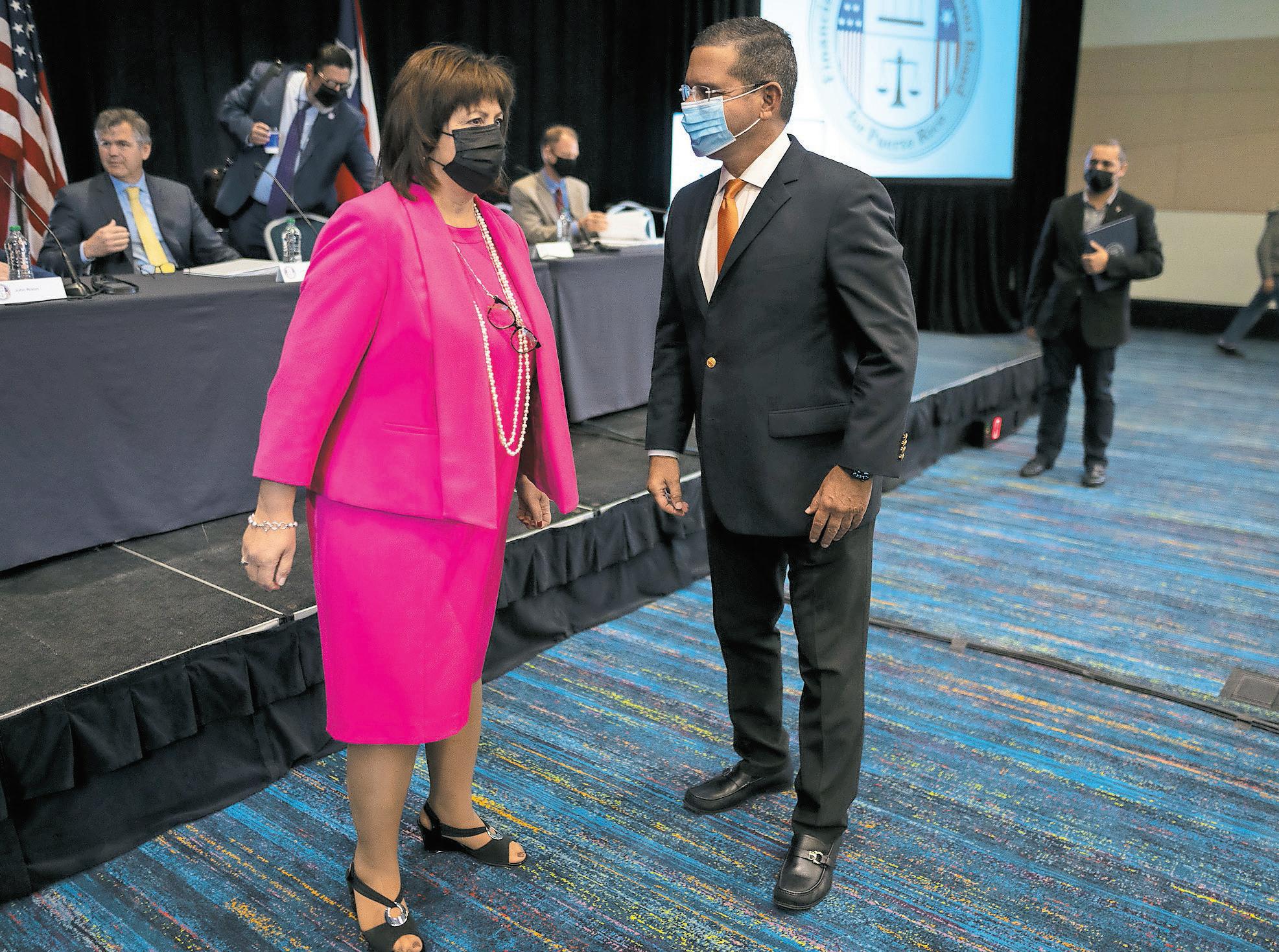
6 minute read
Government and fomb come to terms on pension laws
Government Avoids Falling Back into Old Bad Habits
FOMB and Governor Pierluisi come to agreement over Pension laws
Advertisement
Zoe Landi Fontana, The Weekly Journal
The Financial Oversight and Management Board of Puerto Rico (FOMB) and the administration of Governor Pedro Pierluisi came to agreement over Joint Resolution 33, and Acts 80-2020, 81-2020, and 82-2020 after the Board filed a lawsuit against the latter last week. Their agreement will “...avoid costly and timeconsuming litigation and a potential delay in confirmation of the Plan of Adjustment to reduce
Puerto Rico’s debt and end bankruptcy…” and “... move Puerto Rico forward without the risk of falling back into old practices of overspending,” the
FOMB said in a written statement. The government entities have 60 days to reach an agreement regarding enhanced retirement benefits for police officers, and 120 days to agree on the possibility of providing increased compensation packages to teachers.
Problems With Joint Resolution 33 And Acts 80-82
The three laws - Acts 80-2020, 81-2020, and 82-2020 - were intended to increase benefits for retired policemen and teachers, the cost of which the Board deemed unaffordable under the current fiscal plan. The pension law promised increases in benefits projected to cost at least $8.3 billion. “The government enacted Act 80, Act 81, and Act 82 in August 2020 without sufficient analysis of how much the new retirement benefits would cost and how to pay for the additional costs,” the Board expressed in a statement. “We have been working for five years to reduce Puerto Rico’s debt to sustainable levels. The Plan of Adjustment is now in the process of confirmation. Yet, the three pension laws create new pension debt obligations tied to an already bankrupt pension system,” said Board Chairman David Skeel. Over the past year, the Board and Government were working to find reasonable and affordable ways to implement new pension laws, but agreement was never reached. Furthermore, the administrations of former Governor Wanda Vázquez and Governor Pierluisi had agreed not to implement the Pension laws without approval from the Board. Thus, after Governor Pierluisi went ahead and submitted Acts 80-82, which would have gone into effect within 30 business days, the Board commenced legal action to stop them. In a letter from Dec. 20, 2021 to Fiscal Agency and Financial Advisory Authority (AAFAF, for its
Spanish acronym) director Omar Marrero Díaz, Chairman Skeel wrote of Joint Resolution 33 and Acts 80-82; “The costs from these laws would make the Plan of Adjustment not feasible. Moreover, these laws inequitably select certain groups of We have submitted the employees for special enhanced pension benefits while other employees will only receive payment in agreement to judge Laura Taylor Swain knowing that the full of their pension pursuant to prepetition laws… provided in the Plan of Adjustment.” legislation approved in 2020, despite its laudable purpose, are not totally consistent with the Fiscal Plan. –Pedro Pierluisi, governor of Puerto Rico
In fact,
Natalie Jaresko, executive director of the Financial Oversight and Management Board (FOMB) and Gov. Pedro Pierluisi. >Carlos Rivera Giusti / The Weekly Journal
An Agreement Is Reached
Nevertheless, Pierluisi announced earlier this week his administration and the FOMB had reached an agreement to improve the pensions of retired policemen and for an incentivized early retirement window for several government agencies. According to Pierluisi the retirement window would allow for fiscal savings and alternatives to better teachers’ salaries.
The governor informed the agreement had been submitted to federal judge Laura Taylor Swain for her approval. “We have submitted the agreement to judge Laura Taylor Swain knowing that the legislation approved in 2020, despite its laudable purpose, are not totally consistent with the Fiscal Plan,” Pierluisi admitted.
The governor explained the agreement outlines an alternate plan to achieve the goals originally set by Acts 80, 81 and 82 from 2020.
Consumer prices up 5.7% over past year
November increase continued a string of annual price gains that have exceeded the 2% inflation target set by the Federal Reserve
Martin Crutsinger, The Associated Press
WASHINGTON — U.S. consumer prices rose 5.7% over the past year, the fastest pace in 39 years, as a surge in inflation confronts Americans with the holiday shopping season.
The November increase, reported by the Department of Commerce, followed a 5.1% rise for the 12 months ending in October, continuing a string of annual price gains that have run well above the 2% inflation target set by the Federal Reserve.
Consumer spending, which accounts for 70% of U.S. economic activity, rose 0.6% in November, a solid gain but below the 1.4% surge in October.
“Consumers spent with less enthusiasm in November as they shifted their holiday shopping to earlier in the season and continued to contend with escalating prices and reduced product availability,” said Kathy Bostjancic, chief U.S. financial economist at Oxford Economics. rose 0.6%, slightly lower than the 0.7% monthly gain in October. Core inflation, which excludes volatile energy and food prices, rose 0.5% in November. Core inflation has risen 4.7% over the past 12 months. That is the fastest pace for the core reading since a 5.1% rise in the 12 months ending in September 1983. The 5.7% increase for overall inflation was the fastest 12-month gain since a 5.8% increase for the 12 months ending in July 1982.

More Positive Data
Personal incomes, which provide the fuel for future spending increases, rose 0.4% in November, slightly lower than the 0.5% increase in October. Both gains came after a 1% plunge in incomes in September, the month that government benefit programs, such as expanded unemployment benefits, came to an end.
The big jump in the Commerce Department’s price gauge was similar to the rise in the consumer price index (CPI), up 6.8% for the 12 months ending in November, also the biggest surge by this measurement in 39 years. While the CPI is the better known price gauge, the Federal Reserve prefers to follow the Commerce Department’s personal consumption expenditures (PCE) price index in setting its interest-rate policies to fight inflation. The PCE price index tracks the actual purchases consumers are making each month while the CPI follows a fixed market basket of goods. For the month of November, the PCE price index
The Biden Administration
Republicans contend that the sizable gains in inflation are evidence that President Joe Biden’s economic policies are not working and are actually harming Americans whose incomes are not keeping up with
In fact, rising prices. The administration, however, points to the nation’s rapid reConsumer spending rose 0.6% in November, a solid gain but below the 1.4% surge in October opening following a pandemictriggered recession, an economic event that is unprecedented in our lifetimes. Suppliers have been unable to keep up with demand, pushing prices up sharply and clogging the nation’s ports with goods that can’t be unloaded fast enough. The Federal Reserve last week announced that it was accelerating the pace of change to fighting inflation pressures with an expectation that it could raise interest rates next year by possibly three times to slow growth and keep inflation from getting out of hand. While the Fed has stopped calling the inflation increase transitory, Biden administration officials Consumers spent with less enthusiasm in November as they shifted their holiday shopping to earlier in the season and continued to contend with escalating prices and reduced product availability.
continue to insist that the price surge being seen now will start to fade next year as supply chain problems get resolved. They noted that energy prices including the cost of gasoline have already started to fall.
The government reported that the overall economy, as measured by the gross domestic product, grew at an annual rate of 2.3% in the JulySeptember quarter, up from a previous estimate of a slightly slower 2.1% gain. Economists are expecting more rapid growth perhaps as high as 7% in the current quarter, although some analysts are saying that rebound could be jeopardized if the new COVID Omicron variant keeps spreading and triggers another shutdown of the economy.



